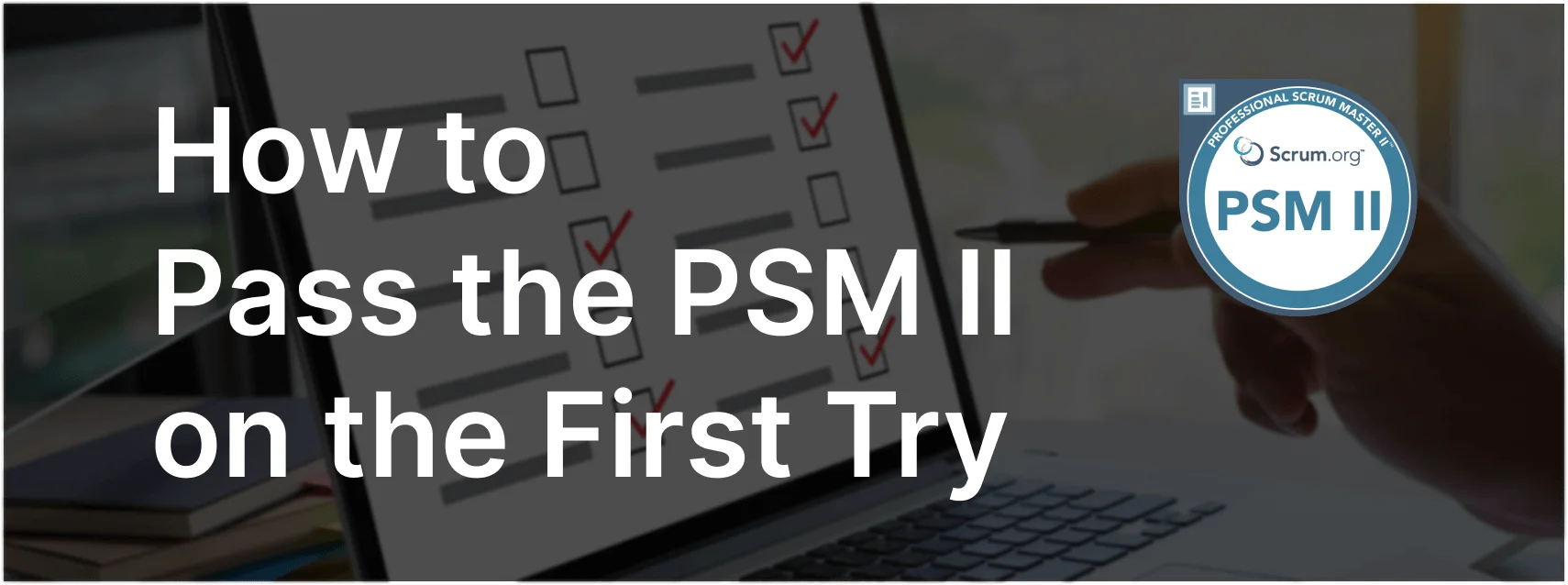
SAFe SPC Exam Guide
The journey to becoming a SAFe Practice Consultant (SPC) is an exciting one, filled with opportunities to deepen your Agile knowledge and contribute significantly to

Becoming a certified Scrum Master is an impressive feat for anyone interested in agile project management. However, passing the Scrum Master PSM II exam can be a challenge, even for experienced Scrum Masters. This exam evaluates your knowledge and understanding of Scrum theory, practices, and principles, as well as your ability to apply them in complex scenarios. With the right preparation and mindset, though, you can pass the Scrum Master PSM II exam on your first try. In this article, we will share some expert tips, strategies, and practice tests to help you prepare effectively and boost your chances of success.
Before you begin preparing for the Scrum Master PSM II exam, it’s important to understand its format and content. The exam is a 90-minute online test with 30 multiple-choice questions that assess your ability to apply Scrum principles and practices in complex situations. The passing score is 85%, which means you need to answer at least 25 questions correctly. The exam fee is $250 per attempt, and you can take it multiple times if you don’t pass on the first attempt.
Practice tests are essential to help you prepare for the Scrum Master PSM II exam. They provide you with an opportunity to assess your knowledge and skills, identify your strengths and weaknesses, and gain confidence in your ability to pass the exam. There are many practice tests and questions on the internet to choose from, however, it’s difficult to know if they are kept up to date or even correct. The Exam Prep for PSM II was created to solve this problem and provide the best chance for passing the exam.
To get the most out of practice tests, you should use them as follows:
Passing the Scrum Master PSM II exam requires a combination of knowledge, skills, and mindset. You need to have a deep understanding of Scrum theory and practices, as well as the ability to apply them in complex scenarios. You also need to manage your time wisely during the exam and demonstrate true leadership. By following the tips and strategies outlined in this article and using resources like the Exam Prep for PSM II, you can increase your chances of passing the exam on your first try and becoming a certified Professional Scrum Master II. Good luck!
Those who hold the PSM II certification have proven their ability to apply Scrum principles and practices in complex real-world situations. The PSM II assessment evaluates your ability to use Scrum to solve complex problems and optimize value delivery. The exam consists of 30 multiple-choice questions, and you have 90 minutes to complete it. The passing score for the PSM II assessment is 85%.
Official PSM II™ exam details:
The time it takes to prepare for the exam depends on your previous experience with Scrum and your learning style. On average, it takes 1-2 months of preparing for the exam, however, it can be taken in less time depending on how much you’ve already mastered.
The exam is updated periodically to ensure that it remains relevant and up-to-date with the latest practices. Be sure to check for updates and changes to the exam content before taking the exam.
The PSM I and PSM II exams are both certification exams for Scrum Masters, but they differ in their level of difficulty and focus. The PSM I exam is designed to assess your fundamental understanding of Scrum, while the PSM II exam is more advanced and evaluates your ability to apply the Scrum framework and its principles in given complex scenarios and use cases.
Yes, you can take the exam multiple times if you don’t pass on the first attempt. However, you need to pay for each attempt.
Passing the PSM II assessment demonstrates your advanced knowledge of Scrum and your ability to apply it in complex situations.
Benefits of passing the PSM II assessment include demonstrating your ability to apply Scrum principles and practices in complex situations, which can lead to career advancement opportunities and a competitive edge in the job market. Additionally, passing the PSM II assessment can increase your earning potential, provide a foundation for further Scrum certifications, such as the PSM III or the SPS certification, and enhance your coaching and mentoring skills.
There is no prerequisite to taking the PSM II Certification assessment. You can take the PSM II assessment if you feel you already possess a high level of Scrum knowledge, in-depth Scrum experience, and applying Scrum to solve advanced, complex problems in the real world.
The certification does not expire, and there is no need for renewal. However, staying up-to-date with the latest techniques and skills are crucial for maintaining your professional edge.

The journey to becoming a SAFe Practice Consultant (SPC) is an exciting one, filled with opportunities to deepen your Agile knowledge and contribute significantly to

Having problems logging in or simply forgot your password? Here are simple steps on how to reset your password and start learning again.

The Professional Scrum Master I (PSM I) certification is one of the most popular certifications for professionals who want to demonstrate their understanding of the

The Professional Scrum Master III (PSM III) exam is a challenging assessment that requires a deep understanding of the Scrum framework and its application in